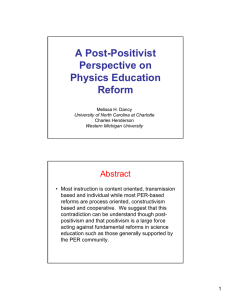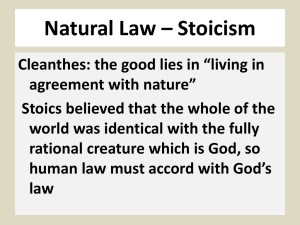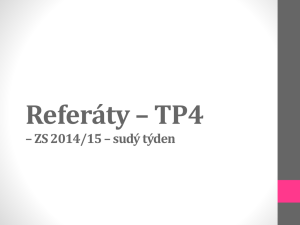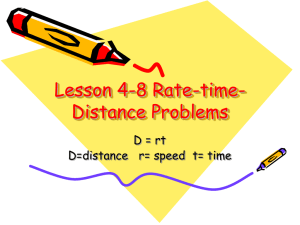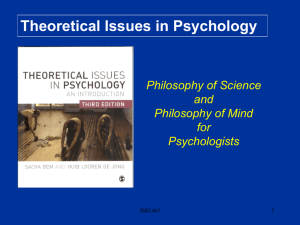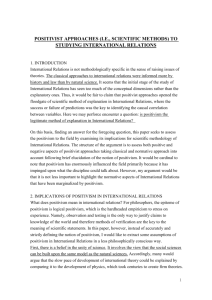Contrasts between positivism and post
advertisement
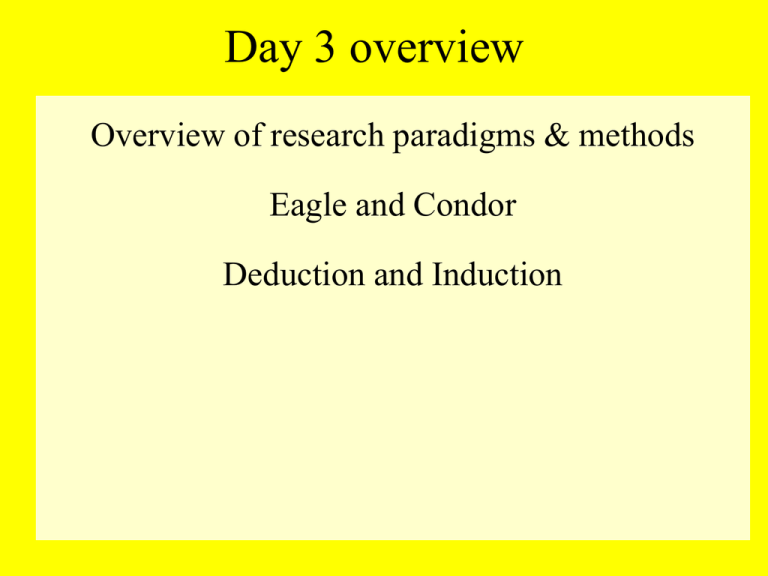
Day 3 overview Overview of research paradigms & methods Eagle and Condor Deduction and Induction Rapanui Rapanui Descarte 1596-1650 If you would be a real seeker after truth, it is necessary that at least once in your life you doubt, as far as possible, all things. The Cartesian Split • Consiousness: I can’t doubt that I doubt “cogito ergo sum” (“I think therefore I am”). The inner reality. • Perfection I can conceive of the “perfect entity”, therefore there must be one (God) • A just God There must an “outer reality”, which is stable, measurable and has mathematical properties. God wouldn’t play tricks on us • Dualism Therefore there is an inner and an outer reality operating under different rules The connection between mind and body Auguste Comte (17981857) – Sociology & Positivism Positivism Metaphysical (nature of reality) assumptions • Nature is orderly and regular (measurable); • We can know nature. (Some theorists suggest that there exists a limit to such knowledge. Up to now, such a limit has not been defined.) • All natural phenomena have natural causes (Determinism). • Nothing is self-evident (e.g. the assertion that “2/3” or “√2” is not a rational number – a number that can be written - has to be proved.) The square root of 2= 1.4142135623731….. Firstly, assume sqrt(2) is rational, i.e can be represented as the irreducible fraction m/n where m and n are integers. We have sqrt(2)=m/n. Squaring, and multiplying both sides by n2, we get m2 = 2*n2. This tells us that m2 is even. Now the only way to get an even square is to have its root also even, because even*even=even and odd*odd=odd. So m must also be even. This means that we can write m = 2*k where k is another integer. So now we can rewrite m2 = 2*n2 as (2*k)2 = 2*n2 = 4 * k2. Halving both sides of this, we get n2 = 2 * k2. This tells us that n2 is even. So n must also be even by the same reasoning as given above. So we can write n = 2 * j. So if m is even and n is even, then m/n is not an irreducible fraction. And this argumentation can go on for ever. So the assumption that sqrt(2) is rational must be wrong, thus sqrt(2) is irrational. Q.E.D. Positivism Epistemic (nature of knowledge) assumptions • Knowledge should only be derived from experience. (Empiricism) • The meaning of a proposition consists in how it is verified by experience. (verifiability). • The application of logical analysis will reach the goal of unified science. (Logicism). • Sciences should all be unified syntactically and semantically. Deductive Logic in Quantitative Research Variables: All Granny Smiths are apples All apples have pips Logical Reasoning Construct All Granny Smiths have pips Empirical Investigation Observations Test 100 randomly selected Granny Smiths for pips Deduction If I am your father then you are my daughter I am your father You are my daughter If I have appendicitis, I am very sick I am very sick I have appendicitis All primates are social creatures All humans are social creatures All humans are primates Criminals are people Criminals are dishonest Criminals are dishonest people Actual and Estimated production of oil and gas – Peak Oil Inductive Logic in Qualitative Research Concept Granny Smiths are a type of apple Logical Reasoning Narrative: Granny Smiths have a strong resemblance to apples except that they don’t go red or yellow, they stay green Empirical Analyses Observations: Granny Smiths have pips, are crisp, sweet, and green on the outside Induction I take 20 marbles from a bag They are all black All the marbles in the bag are black UFOs leave giant craters where they land There are giant crater imprints in Oregon UFOs have landed in Oregon Lithium causes vomiting in monkeys Monkeys and humans are primates Lithium will cause vomiting in humans Socrates was a great man Socrates had a mother All great men have mothers Annual growth rate = 3.5% Karl Popper Karl Popper’s “falsification” principle. • Theories cannot be proven by doing endless confirmations of their predictions - the inductive argument • One falsification of a theory is sufficient to disprove it - Newton and Einstein • Science can never be more that a hypothesis waiting for falsification • If an hypothesis is not falsifiable (testable) it is not scientific Modernism • Positivism, empiricism - a stable singular observable reality • Strong faith in science and that behaviour is reducible to physics and chemistry • technological solutions to problems, industrialisation, victory over nature • destruction of religious/cultural/class dogma /power • Humanistic moral force • research as defined, structured, quantifiable process Georges Seurat 1885 -pointillism atomisation Pablo Picasso, Le guitariste, 1910 reductionism Pablo (or Pablito) Diego José Santiago Francisco de Paula Juan Nepomuceno Crispín Crispiniano de los Remedios Cipriano de la Santísima Trinidad Ruiz Blasco y Picasso López Victory over nature A.M. Cassandre French, 1901 1968 Nord Express (North Express), 1927 Arthur Charles Radebaugh American, 1906 - 1974 Bendix Products, 1937 Gerrit Rietveld Dutch, 1888 - 1964 G. A. van de Groenekan, fabricator (Holland) Zig-Zag sidechair, 1939 Christopher Dresser English, 1834 1904 Linthorpe Art Pottery, manufacturer (Middlesbrough on Tees, Yorkshire) Sea Urchin vessel, 1879–1882 Moder -nism and Christianity Some NZ Humanist principles • Live a worthwhile life • Contribute to the wellbeing of our fellow humans, since we depend on each other. • Care for the health of the environment that nurtures us. • Hurt not others with that which pains yourself. • Do as you would be done by • Children should be brought up to be honest, kind and fair. The birth and death of stars Home New Work Early Work Drawings Product News Links Contact Naïve John Good Old Modernism Takes a Ciggy Break 1992 Postmodernism (in complete defiance of the rules of science) flies away from exhausted Modernism Postmodernism Metaphysical and Epistemological assumptions • • • • multiple and individual realities the idea of “other” an absence of universals (metanarratives) rejection of structural and hierarchical models – surface (lateral) not depth (vertical) relationships • methodology of deconstruction • research as a creative interactive qualitative process Jean-Paul Sartre & Simone de We are the only beings Beauvior - Existentialism conscious of our own existence. We cannot have an “innate” nature. We have to create our own nature Post-structuralism • An extension/rejection of structuralism – the meaning of words is dependent on their relationship to other things • Objects exist independently of thought • All things only have meaning within social space (relationships, discourse [thought and language]) – social construction • Meaning is constructed and can be deconstructed by discourse (anchors themes) • Meaning is always in flux and where it is ambiguous is a pointer to shifting conditions of power There is no one theory or perspective that defines everything An ethical and moral vacuum ? Michel Foucault – power and ethics: “From being an art of unbearable sensations, punishment has become an economy of suspended rights” Foucault • Rejection of idea that there is position from which you can observe all history – having a transcendent consciousness • Understanding the location and movement of power is the key function of discourse analysis • Everything is capable of multiple meaning – there are no experts • The “confession” and the “examination” as mechanisms of oppression in social services • Maintaining a stance through ethics based on autonomy of the participant, reflexivity, and critique Jacques Derrida Deconstruction - text analysis 1. Find tensions and instabilities in the text 2. Question assumptions which are set as self evident, natural or original 3. Look for the binaries (man-woman), developed-underdeveloped) – is there a power hierarchy? How stable is the binary? What does it exclude? 4. Look for paradox – where an author subverts his/her own intentions Derrida - defining deconstruction.wmv Post-positivism • critical realism. there is a reality independent of our thinking about it • all observation is fallible and has error and that all theory is revisable • the goal of science is to hold steadfastly to the goal of getting it right about reality, even though we can never achieve that goal • objectivity is a group perspective, requiring multiple measures and methods • knowledge evolves through a process of variation, selection and retention Contrasts between positivism and postpositivism[1] Positivism Emphasis on parts and decontextualization Post-Positivism Emphasis on whole and contextualization Emphasis on separation Emphasis on integration Emphasis on the Emphasis on the general specific Consideration only of Consideration also of objective and the subjective and the nonquantifiable quantifiable Contrasts between positivism and post-positivism[1] Positivism Post-Positivism Reliance on experts and outsider knowledge-researcher as external Consideration also of the "average" participant and insider knowledgeresearcher as internal Focus on prediction Focus on understanding Top-down Bottom-up Attempt to standardize Appreciation of diversity Focus on the product Focus on the process as well Transformative/Emancipatory paradigm Has a focus on social justice, the experience of oppression, the differentials of power, and the cultural, political, economic and historical perceptions of “reality”. It builds on Foucauldian ideas of ethics and asks for a constant effort to move taken-for-granted knowledge to conscious examination while accepting the post-positivist agenda
